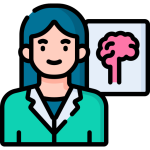Neurologists and Cardiologists
If you’ve had a stroke, it’s very likely you will see a neurologist and a cardiologist as part of your healthcare team. Neurologists and cardiologists are doctors that have a lot of special training in their areas.
Neurologists are doctors who specialize in the brain and nervous system. This includes the spinal cord and nerves throughout the body. Because a stroke causes injury to the brain, neurologists often work with people who have had strokes. Neurologists can do brain testing, manage symptoms, and recommend treatments to reduce the risk of a future stroke. Your neurologist might take scans, or pictures, of your brain to see where there is damage. A neurologist might also test things such as your coordination, sensation, vision and reflexes. This helps to determine how your brain is working. Neurologists do not do brain surgery. If you need a brain surgery, you will be referred to a neurosurgeon. Neurologists also work with a variety of other conditions, such as Parkinson’s, multiple sclerosis (MS) and brain infections.
Cardiologists are doctors who specialize in the heart and cardiac system. This includes all the veins, arteries and blood vessels that carry blood around the body. Because a stroke involves the blood flow to the brain, a cardiologist is likely to be involved in your healthcare team. If you meet with a cardiologist, they will likely start with a physical examination. The doctor might order additional testing like blood work, an X-ray, or more advanced testing to look at your heart’s function. A cardiologist will not perform heart surgery. If you need a heart surgery, you will work with a cardiac surgeon.
Both of these doctors are very important members of your healthcare team because of their specialized training. They can do testing, manage symptoms and perform procedures that your family doctor cannot do. With their help, you can learn more about your health and how to stay as healthy as possible in the future.
Explore the links below to learn more about some of the healthcare providers that may be part of your team.
Speech-Language Pathologists

Occupational and Physical Therapists

Neurologists and Cardiologists

Case Managers and Social Workers

Nurse
Practitioners

Dietitians and
Nutritionists

